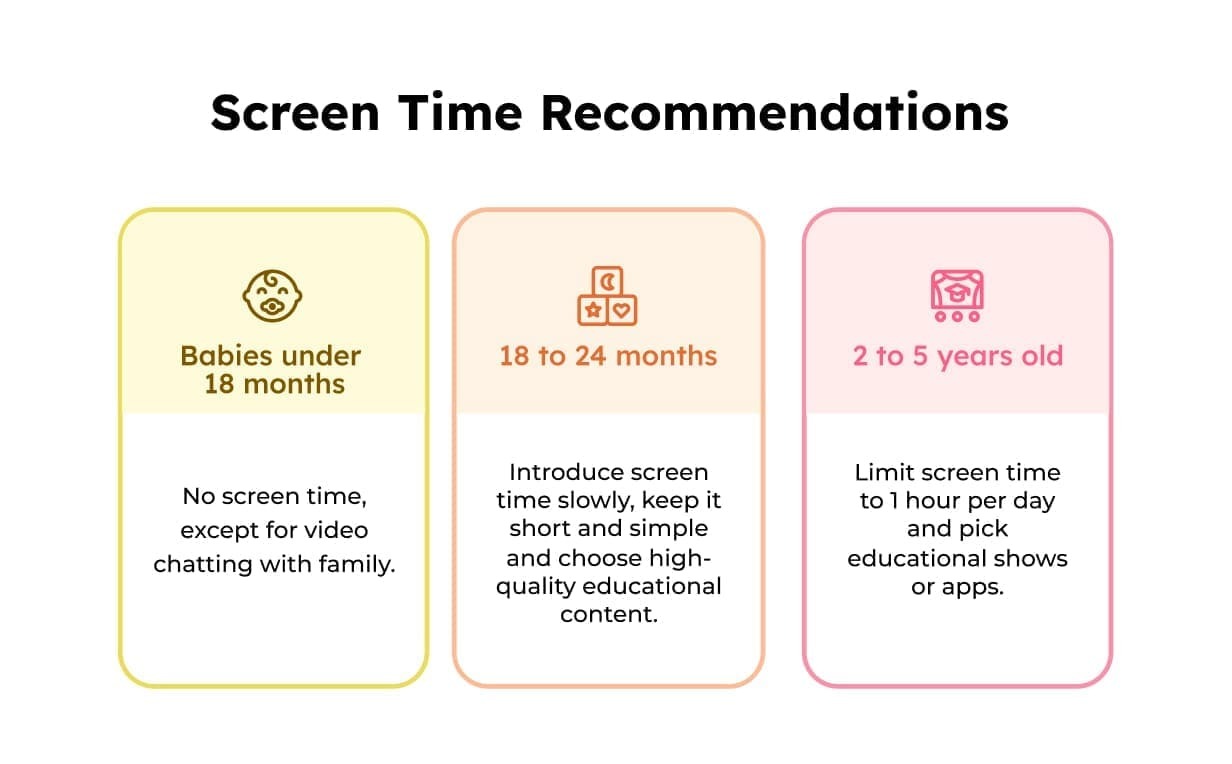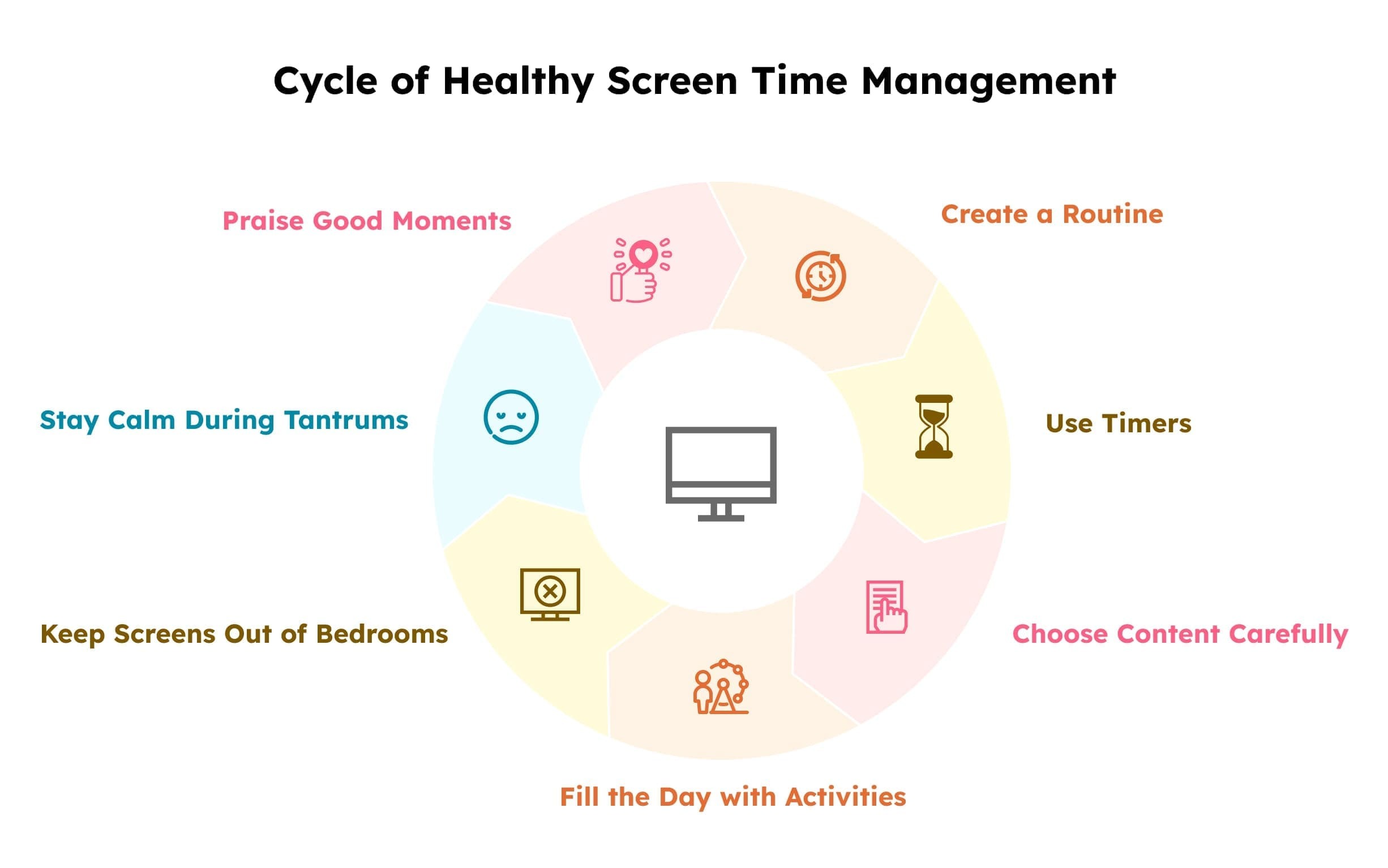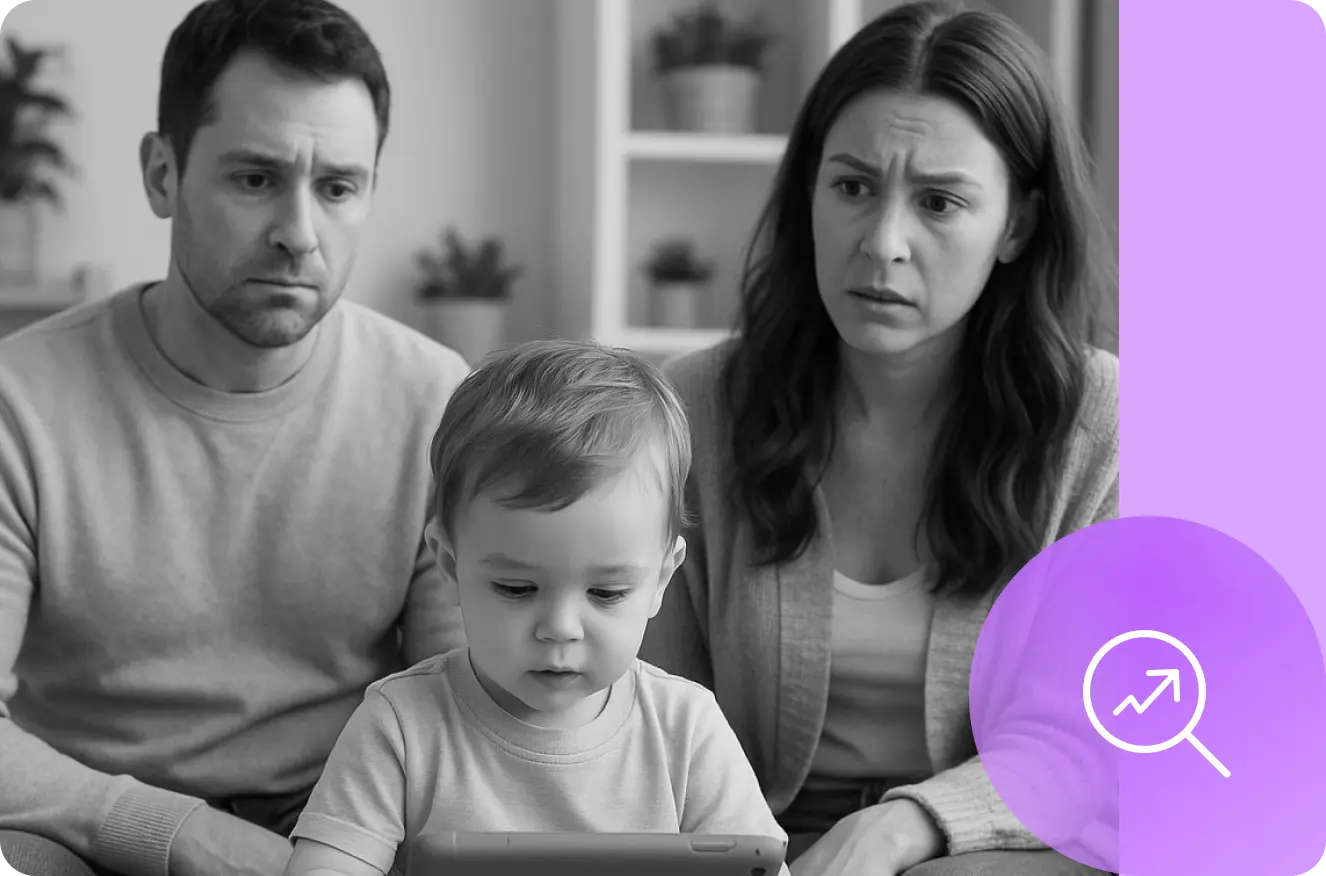It’s never been easier to stay entertained and connected. Thanks to smartphones, tablets, and TVs, we have access to our favorite shows, games, and movies any time we want.
But as screens become a bigger part of our daily lives, a growing concern is emerging — especially when it comes to children. Kids today are growing up surrounded by technology, often getting their own devices at an early age. With screens in nearly every room, it’s not uncommon for young children to spend hours each day watching cartoons, scrolling through videos, or playing games.
Research shows toddlers are spending a surprising amount of time on screens:
- Children under 2 years old spend around 1 hour a day on screens. That includes TVs, phones, and tablets.
- Kids aged 2 to 5 average about 2 hours and 30 minutes a day.
- Nearly half (47.5 %) of children aged 2 to 5 get more than 2 hours of screen time per weekday.
That means many little ones spend a big chunk of their day attached to screens, long before the age of 8.
With that in mind, it matters now more than ever to think about how screen use fits into your child’s day, and how to set healthy limits on screen time for toddlers.
Why Too Much Screen Time Is Bad for Toddlers
Most parents have probably had moments where handing over a phone or tablet feels like the easiest way to keep a toddler calm. But when screens become a big part of their daily routine, it can start to affect their health and development in ways we don’t always notice right away.
Pediatricians now talk about screen time for children regularly during check-ups, because they’re seeing more and more toddlers glued to devices. And while TVs have been around for decades, smartphones and tablets in little hands are something newer and growing fast.
Here’s what too much screen time for toddlers can do:
1. It can lead to weight gain
When toddlers spend a lot of time sitting and watching a screen, they’re not moving their bodies. Over time, less movement can lead to unhealthy weight gain. Some kids also snack more when they’re in front of a screen, which adds to the problem.
Studies show that long screen time is linked to a higher risk of obesity, even in children under five.
2. It can mess with sleep
Screens, especially before bedtime, can make it harder for toddlers to fall asleep. The bright light from screens can confuse their brains and delay the release of melatonin, the hormone that helps them feel sleepy. If your toddler is staying up late or waking up grumpy, too much screen time might be part of the reason.
3. It can affect behavior
Toddlers who spend a lot of time on screens may have more tantrums and angry outbursts. Some experts say it’s because screens give the brain a fast rush of feel-good chemicals like dopamine. When the screen goes off, that happy feeling drops, and some toddlers don’t know how to handle it yet. That’s when the tears and screaming often start.
4. It can delay learning
Little kids learn best by exploring, playing, talking, and interacting with people, not by watching videos or swiping screens. If toddlers are spending hours each day watching shows or playing with apps, they’re missing out on chances to build language, social, and problem-solving skills. Studies have found that screen time in the early years can delay communication and slow down development.
5. It can affect attention span
Fast-moving shows and apps can train a toddler’s brain to expect constant excitement. This can make it harder for them to focus on slower activities, like reading a book or playing with blocks. Some studies link higher screen time to attention problems later on.
6. It can show the wrong things
Not all media is made for toddlers. Some shows or games include violence, bad language, or behavior that young children don’t understand yet. Even if it seems like they’re too young to get it, kids absorb more than we think.
7. It can strain their eyes
When toddlers stare at screens up close, it can lead to dry, tired eyes and eye strain. They blink less, which makes their eyes feel uncomfortable. Spending less time outdoors and more time on screens may also raise the risk of nearsightedness as they grow. Plus, using screens in the evening can mess with their internal clock and make falling asleep even harder.
How Much Screen Time Is Okay for Toddlers?
With so many screens around, it’s tough to know how much is too much. Luckily, experts like the American Academy of Pediatrics (AAP)[1] have clear guidelines to help parents make good choices around screen time for children.
Here’s what they recommend based on your child’s age:

Babies under 18 months
- No screen time at all, unless it’s for a video chat with family.
- Babies at this age learn best from real-life interaction, not from screens. Talking, singing, and cuddling go a long way in building their brains.
18 to 24 months
- You can slowly introduce screen time, but keep it short and simple.
- Choose high-quality, educational content and always watch together. Your toddler won’t learn much from watching alone, but if you sit with them and talk about what’s on the screen, it can help them connect it to the real world.
2 to 5 years old
- Limit screen time to 1 hour per day, max.
- Stick to educational shows or apps that teach something valuable like counting, kindness, or letters.
- Watch together when you can. Pause and talk about what’s happening. This helps toddlers learn more and makes the experience feel more personal.
Quick note:
These limits don’t include video chatting with loved ones or screen time used for special needs support. The key is balance. Screens are fine in small amounts, as long as your toddler also gets plenty of sleep, active play, family time, and hands-on learning.
Tips to Set Healthy Screen Time and Handle Tantrums

Cutting back on screen time for toddlers is not always easy. You might hear “Just five more minutes!” more times than you can count. But don’t worry, plenty of parents are in the same boat.
With a few smart tricks (and lots of patience), you can help your child build better screen habits and make things a little smoother for everyone.
Here are some tips that actually work:
1. Create a simple screen time routine
Kids do better when they know what to expect. Set clear rules like:
- One show after lunch.
- No screens during meals or before bedtime.
- All screens off by 6:00 p.m.
Stick to the same routine every day so your toddler learns the pattern. When screen time is predictable, it’s easier to avoid arguments.
2. Use timers or visual cues
Toddlers don’t always understand “in 10 minutes,” but they do understand timers or visual reminders.
- Set a kitchen timer or a countdown clock.
- Use simple phrases like “When the timer beeps, the iPad goes to sleep.”
Let them know when time is almost up so the switch isn’t a surprise.
3. Pick shows and apps carefully
Not all screen time is equal. Choose content that’s:
- Slow-paced and age-appropriate.
- Made to teach letters, numbers, or life skills like kindness.
- Free of ads, violence, or fast switching scenes.
Also, watch with your child when you can. Pause and talk about what you see. This helps your toddler learn and connect screen time to real life.
4. Fill the day with other fun stuff
Toddlers often ask for screens because they’re bored. Keep a few go-to activities ready:
- Crayons and paper
- Sensory bins
- Simple puzzles
- Music and dancing
- Outside time—even just a walk or water play
Switch things up often. You don’t need fancy toys; just things that let your child explore, move, and imagine.
5. Keep screens out of bedrooms and mealtimes
Make some places in your home “no screen zones.” For example:
- No phones or tablets at the table.
- No TVs or devices in the bedroom.
- Screen-free story time before bed.
These small rules protect sleep and family time, and they make screen time feel more like a treat than a habit.
6. Stay calm during tantrums
If your toddler throws a fit when it’s time to turn off the screen, you’re not alone. This happens a lot.
Here’s what helps:
- Stay calm and firm. “I know it’s hard, but screen time is over now.”
- Don’t give in. If tantrums lead to more screen time, your child will try it again next time.
- Offer a new choice. “Let's blow bubbles!” or “Can you help me make a snack?”
Sometimes the tantrum needs to run its course, and that’s okay. Stick with the routine. It gets easier with time.
7. Praise the good moments
When your toddler turns off the screen without a fuss, say something like:
- “Thanks for listening!”
- “You did a great job putting the tablet away.”
Positive words go a long way. They help your child feel proud and more willing to cooperate next time.
Final Thoughts
Screens are part of everyday life now, and children are growing up surrounded by them. That’s not always a bad thing, but too much screen time for toddlers can take away from the things that matter most at this age: moving, playing, sleeping well, and connecting with real people.
The good news? You don’t have to ban screens altogether. Just set simple limits, stay involved, and keep plenty of screen-free fun in the mix. It’s okay if things don’t go perfectly every day. What matters most is building habits that support your child’s health and development, one small step at a time.
Advice You Can Trust
At illumine, we’ve spent nearly a decade working with thousands of childcare centers, preschools, and nurseries across 50+ countries. We’ve helped educators and families navigate everything from lesson planning to daily routines, parent communication, and more.
That experience has taught us what really works — and what doesn’t — when it comes to raising happy, healthy, screen-smart toddlers. So when we share tips about screen time for toddlers, you can trust they’re rooted in real-world experience with children, parents, and schools just like yours.
We're here to help you make the best everyday choices for your little one.
References:
Hill, D., Ameenuddin, N., Chassiakos, Y. R., Cross, C., Hutchinson, J., Levine, A., Boyd, R., Mendelson, R., Moreno, M., & Swanson, W. S. (2016, November). Media and young minds. Pediatrics, 138(5). https://publications.aap.org/pediatrics/article/138/5/e20162591/60503/Media-and-Young-Minds










